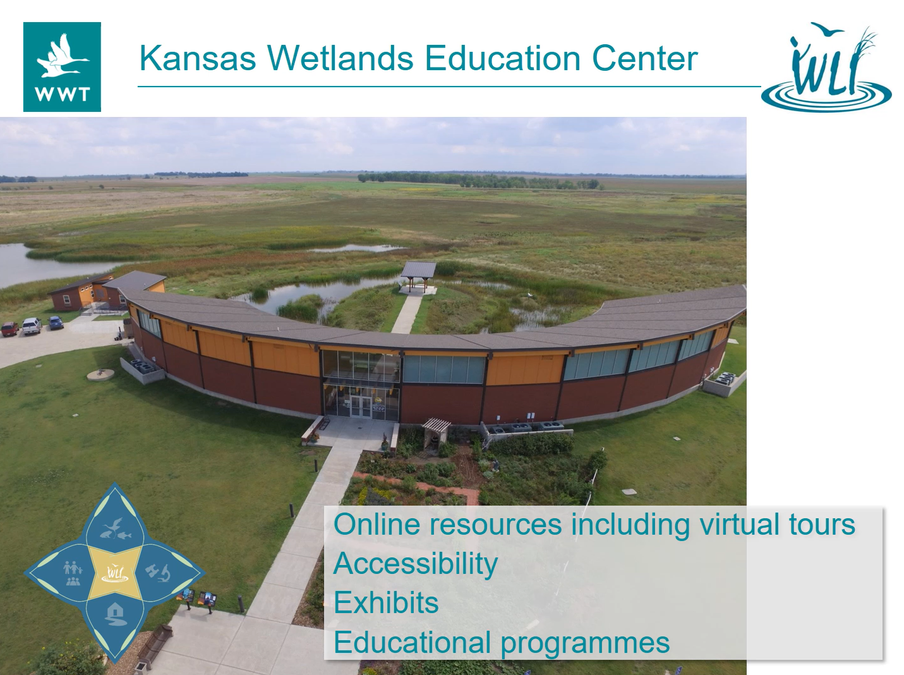The Kansas Wetlands Education Center has been recognized as one of the world’s best wetland visitor centers. Their success was announced at the Conference of the global Wetlands Convention, known as Ramsar COP14, underway in Geneva, Switzerland.
The Star Wetland Centre Award is a new initiative to recognize best practices in eco-tourism and education at wetlands. It is coordinated by Wetland Link International (WLI), a support network for staff and volunteers at 300 wetland visitor centers.
Kansas Wetlands Education Center is one of 23 centers worldwide, and one of only 2 in the United States, that have been selected by an international panel of experienced wetlands professionals.
“It’s an honor for the Kansas Wetlands Education Center to be included in a list of other awesome wetlands centers internationally,” says Curtis Wolf, Director of the Kansas Wetlands Education Center.
“While our wetland center is only a small dot on the map, we are encouraged to know we are contributing to a larger shared goal of educating people across the world about nature, conservation, and appreciation of our natural resources.”
“The judges were particularly struck by the high-quality programming,” says Chris Rostron, the Head of WLI and leader of the Star awards process.
“Kansas Wetland Education Center accommodates very wide visitation thanks to good disabled access and audio tours, along with a strong online offering including 360-degree virtual tours and the ‘watcha doing rob’ video series.
The Stars have been awarded to 23 wetland visitor centers around the world at a ceremony at the 14th Meeting of the Conference of the Contracting Parties to the Ramsar Convention on Wetlands (Ramsar COP14).
About Kansas Wetlands Education Center
Opening in April 2009, The Kansas Wetlands Education Center (KWEC) is dedicated to educating the public about wetland communities, their importance, and the need for conservation and restoration, with emphasis on Cheyenne Bottoms and Quivira National Wildlife Refuge. They accomplish this through interactive exhibits and interpretation, educational programs, outreach, and fostering partnerships with stakeholders.
Representing the goals of a number of partnering agencies, including Fort Hays State University, the Kansas Department of Wildlife and Parks, and The Nature Conservancy, the KWEC has a multifaceted mission: Provide visitors with an informative and educational experience. Serve as an educational resource for schools, teachers, and other groups interested in conservation and eco-tourism. Inform visitors of the economic impact of Cheyenne Bottoms to the local and state economy.
Cheyenne Bottoms is a Ramsar Convention designated Wetland of International Importance and a globally important stopover for thousands of migratory shorebirds and waterfowl; the site also supports other threatened or endangered birds during nesting, staging, or wintering periods. It is a Western Hemispheric Shorebird Reserve Network site of hemispheric importance to shorebirds. Cheyenne Bottoms is made up of the Kansas Department of Wildlife, Parks Cheyenne Bottoms Wildlife Area (19,857 acres), and The Nature Conservancy’s Cheyenne Bottoms Preserve (7,848 acres).
About Wetland Link International
Wetland Link International (WLI) is a global network of wetland education centers. We define a wetland education center as “any wetland where there is interaction between people and wildlife and CEPA (communications, education and public awareness) activity occurs in support of wetland conservation aims.”
WLI is supported by two staff based at the Wildfowl and Wetlands Trust (WWT) at Slimbridge, UK, and a strong regional presence in Asia led by the Ramsar Regional Centre – East Asia. These staff, plus occasional volunteers, share news, opportunities, and requests on behalf of the network by email, Facebook, and Twitter. The emails include two newsletters per year, prepared as PDFs to facilitate printing. We also produce three members’ webinars each year.





